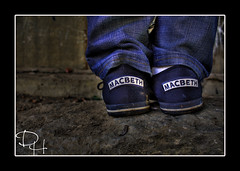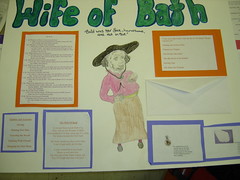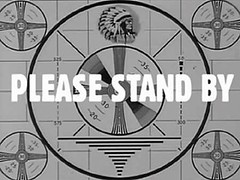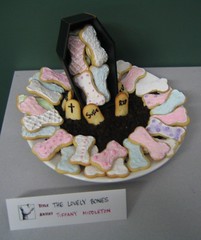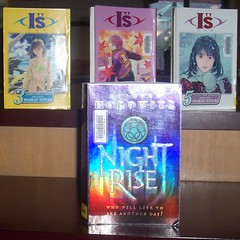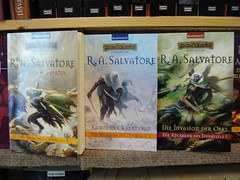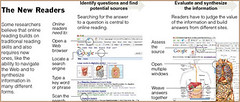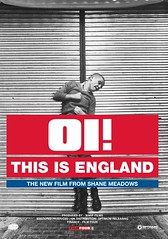Tuesday, December 23, 2008
Happy holidays!
Speaking of family, take this advice from your older and wiser teacher - in a year and a half, most of you will be going off to college and for many of you, that will mark the end of living at home with your family.
Your college years will be full of fun and independence, followed by your first real jobs, first real apartments, and a myriad of amazing experiences before you settle down and have families of your own.
Which is why I want you to take a moment this holiday season to appreciate your family. Perhaps spend an evening at home over break watching a movie with your family or having lunch with your mom or coffee with your dad. Go visit your grandparents and listen to their stories or offer them a helping hand.
These are the moments you'll treasure when you're older and you'll be glad you took the time to slow down your last year and a half at home and spent time with the people who love you unconditionally.
My parents only live four hours away but in this busy world, those four hours seem like an eternity and as a result, I only see them four times a year. I wish I could see my mom and dad on a daily basis, so do me a favor and give your parents a hug daily since I can't hug mine!
Remember - you're only young once but you're old forever, so don't try to grow up too fast. Your friends may come and go but your family will always be there for you, so spend some quality time with them this season.
In the long run, you'll be glad you did.
Have an amazing holiday season - Happy Chanukah, Merry Christmas, and Happy New Year!
Weiss
Wednesday, December 17, 2008
Monday is Independent Reading Day!!!
Monday we are going to the Media Center to READ! That's right - we're not going there to work on a project, or write essays or do research, we're going there so you can escape your little classroom desks and instead find a comfortable place to sit and read.
So, bring your independent reading book - you know, the one purchased with the generous grant I received from the East Brunswick Education Foundation - and meet me in the Media Center on Monday, December 22nd!
Saturday, December 13, 2008
Homework - British Literature
Consider the choices made by Polanski and the student directors of Star Wars Macbeth - what was important to each director when transferring ideas from page to screen? Did he focus on character? Visual effects? Dialogue? Plot?
Write a reaction that answers the above question. Your response should be at least one half page, typed and double spaced if possible. Please follow rules of grammar and mechanics and present your ideas in an organized fashion.
If you want to refresh your memory, check out this link:
http://www.dcfr.net/macbeth/mainpage.html
Period 12: Since you did not view Star Wars Macbeth, please apply the above question to the Polanski version you viewed on Friday. If you want to watch Star Wars Macbeth and focus your response on it, feel free to do so - just go to the above link.
Monday, December 8, 2008
LOST?
Feel better? If you still can't find what you're looking for, such as the info on the SAT Prep Boot Camp, scroll down an entry or two and look on December 3rd.
Writer's Workshop Assignment - RD of Paragraphs 1-3 Due Wednesday!
In the intro paragraph, reflect on a past experience that taught you something about the world around you. Take a moment and brainstorm a few memories.
Step # 2:
In the first paragraph, reveal your INITIAL reaction to an event, conversation, experience, etc. through the use of an informal anecdote. Refer to the section of Hornby's essay below for further clarification.
OH, MY SWEET CAROLINA by Ryan Adams: AN ESSAY BY NICK HORNBY
“A long time ago, when I was still teaching English to foreign students in a London language school, I gave private conversation lessons to an unhappy man who called himself Edward, even though that wasn't his name. Edward was an African living in Rome, where he was a foreign correspondent for his home-town newspaper, and he was unhappy because he was going through a divorce. But he was lucid in his unhappiness: he talked with regret, of course, but also with insight, and enormous intelligence, and his melancholy took him off to all sorts of interesting conversational places — places I never normally got to visit in the normal run of things. I remember the concentration our talks required, and the stillness and intensity they engendered; I knew that he was in pain, but when our fifty minutes were over I felt invigorated and inspired. When it was time for him to return to Rome, he asked me to go and stay with him, and I accepted the invitation.”
Step #3:
In the next section of your essay, continue by making either a contradiction to your initial observation OR further explaining your initial reaction on a deeper level. In this section, it's important to finish reporting your personal response to your experience, but do not offer analysis of the situation. Refer to the section of Hornby's essay below for further clarification:
“But when I got there, a few weeks later, he wasn't unhappy any more. He was revelling in his status as a single man, a status that, apparently, required very little self-reflection or intelligence: on the night I arrived, I found that he'd fixed us up with a couple of call-girls. I copped out, in my prissy English way, but he disappeared for forty-eight hours (leaving me with sole use of a beautiful apartment in the centre of Rome); when he came back, he told me he was engaged
Step #4:
Ok, the third section of the essay is crucial. The first sentence of your third section is the thesis statement – when you look back at the experience described in the first two paragraphs, what is your epiphany? In Hornby's essay, he reflects on his time with Edward and how Edward changes but what he truly realizes is larger than his experience with Edward - he realizes that "some people are at their best when they're miserable". Model this section of the essay by first producing a strong, active statement, like Hornby did - remember, less is more. Keep it simple - a statement - DO NOT USE "I think"!! BE STRONG!
Step #5:
To continue the 3rd paragraph, use an outside source to support your thesis – this could be a song, a scene from a film, a poem, a memory, a personal experience, a moment in a book, a quote, etc. Remember DON’T retell the story of the outside source, just use it to support your thesis statement like Hornby does below:
“Some people are at their best when they're miserable. Ryan Adams's beautiful Heartbreaker album is, I suspect, the product of a great deal of pain, and "Oh My Sweet Carolina" is its perfect, still centre, its faint heartbeat, a song so quiet that you don't want to breathe throughout its duration. (It helps that Adams got Emmylou Harris, the best harmony vocalist in the history of pop music, to sing with him on it.) On Adams's next album, Gold, he seems to have cheered up, and though that's good news for him, it's bad news for me, just as it was when Edward stopped being miserable. His upbeat songs are fine, but they sound a lot like other people's upbeat songs (you can hear the cheeriest incarnations of the Stones, Dylan and Van Morrison all over Gold); his blues gave him distinction.
Step 6:
Finally, you need to come to a conclusion about what it all means to you - this is your "Jerry Springer Final Thought". Tell the reader what you think about not revealing what could potentially be useful information, what harboring guilt can do to a person’s life, how you think excessive pride and ambition is actually a worthy quality, how bitterness toward others is actually the worst form of subjectivity. Do that and then wrap up the section with your “final thought”. See Hornby’s conclusion below:
“What rights do we have here? Are we entitled to ask other people to be unhappy for our benefit? After all, there are loads of us, and only one of them. And how can you be happy, really, if you are only ordinary in your happiness, but extraordinary in your grief? Is it really worth it? It sounds harsh, I know, but if you are currently romantically involved with someone with a real talent — especially a talent for songwriting — then do us all a favour and dump them. There might be a Heartbreaker — or a Blood On The Tracks or a Layla — in it for all of us. Thanks.”
Wednesday, December 3, 2008
SAT Weekend Workshops
http://web.me.com/lapointe23/Site/About_Me.html
or email:
ArtemisEducation@gmail.com for more information
Monday, November 24, 2008
Reader's/Writer's Workshop Submission One Assignment - Rough Draft due
Reader's/Writer's Workshop Submission #1
Instructions in BOLD print
Original Essay in Italics
Step #1: Choose one of your favorite songs and take a moment to examine the lyrics. Consider what the speaker is saying, on a literal level. Identify any silly lines that do not make logical sense.
Step #2: Pretending that you are the songwriter's editor, you're going to craft a short letter to the songwriter questioning his use of language. Take a moment and read the following introduction by John Moe:
NOTES ON "SWEET CHILD O' MINE,"
AS DELIVERED TO AXL ROSE BY HIS EDITOR.
Hi, Axl,
`Just got your manuscript and demo for the song "Sweet Child O' (sic) Mine." I think we need to talk. As your editor, I am responsible for making your songs as cogent as possible, for helping them reach the high editorial standards your public has come to expect. With this one, I am certainly earning my keep. After several attempts to reach you by phone, I am sending along my notes. Please make appropriate fixes as soon as possible, at which point I can send them to copyediting and proofreading in time for your upcoming studio session.
Step #3: Begin to draft a writing that models Moe's essay. Begin with a similar introduction and continue to frame your essay by quoting lines and responding to them, modeling Moe's essay that follows. Use questions and logical, direct statements to address use of illogical statements.
She's got a smile that, it seems to me—Why equivocate? You weaken your point by framing this as a mere personal observation instead of a fact.
Reminds me of childhood memories—Redundant. You either have a memory or you're reminded of something. You're not reminded of a memory. Heavy-metal fans won't stand for such writing, my friend.
Where everything was as fresh as a bright blue sky—I asked around the office and no one is sure a blue sky is "fresh." You could have a blue sky at the end of a long, sweaty day and there would be nothing fresh about it. And she reminds you of a time when things were fresh? Fond reminiscences of freshness are no foundation for love. Fix.
Now and then when I see her face it takes me away to that special place—Again, you're weakening your own argument. Why does the sight of her face transport you only periodically? And is it just her smile or her entire face that does this to you? Because you've already said both. Consistency, Axl!
And if I stared too long, I'd probably break down and cry—Why would you do that? Because you miss the freshness you described earlier? I think the whole "fresh" thing is really tripping you up. Also, crying? Wimpy.
OK, on to the second verse.
She's got eyes of the bluest skies—See, this is just getting worse. Now her eyes are made of sky? Nice imagery, but you just got done saying her smile reminded you of memories of sky. Is this verse actually supposed to be a second draft of the first verse? Am I just confused on formatting? Help!
As if they thought of rain—Axl, eyes can't think of rain. And even if they could, which they can't, why would bluest skies think of rain? Perhaps less imagery of thinking eyes made of sky and more direct exploration of your feelings?
I hate to look into those eyes and see an ounce of pain—Well, hell. I guess in your special Axl World anything is possible. Eyes can be made of sky, ponder the weather, and exhibit pain in amounts that can be weighed.
Step #4:
Take a moment and continue reading Moe's essay. Incorporate one or two word commands as independent sentences such as "Delete. Fix. Do something." This is harder to do than it seems – make sure that you are choosing strong, active words.
Her hair reminds me of a warm safe place where as a child I'd hide—Delete. Fix. Do something. You'd hide in a place that reminded you of hair? Never show me such phrases again.
And pray for the thunder and the rain to quietly pass me by—Whew. OK, listen to me now: Thunder can't quietly do anything. It's thunder. And, more importantly, do you really want to come across as a wuss who's constantly on the verge of weeping and skittering into hair caves to escape from rain? Is this a song about love or climatic anxiety? You need to work these things out.
Step #5: Read the conclusion of the essay and then choose a persuasive technique to employ as your final appeal – you can use either a logical, emotional, or ethical appeal – and then, wrap it up!
Finally, Axl, I think we might have had a misunderstanding regarding my previous notes. When I wrote in colored pencil "Where do we go now?" I wasn't offering that as a lyric. I was simply observing that, in narrative terms, the song needed to progress in some way. You love the girl, she's helping you work through some issues, whatever. So where do we go now? But instead of providing a satisfactory conclusion, you simply took my note and repeated it over and over again before ultimately just stating the title of the song. This is unacceptable. Don't ask us, the listeners, where we go. That's up to you as the writer! Tell us where we go now!
Again, let's try to fix these things soon and get "Sweet Child of Mine" ("My Sweet Child"?) into your fans' hands as quickly as possible. Because, frankly, if it should ever hit the street in its current form, the song would be a colossal failure.
Talk soon!
Your Editor
Tuesday, November 18, 2008
Any Interest in Jumping the Pond? Class Trip to Great Britain!
Do you want to travel to Great Britain? If so, shoot me an email - I'm trying to poll interest for a trip that would take place either this summer or next summer, so let me know if you're interested. If at least 12 students are interested, I'll call a representative and get some price quotes. The trip would hopefully last 10 to 14 days and would cover England, Scotland, and Ireland. Let me know!



Glamis Castle
Here's a picture of Glamis Castle. As you know, Macbeth was Thane of Glamis however in the play, his castle is not Glamis Castle but instead is referred to as the castle at Dunsinane. Since there is no longer a castle at Dunsinane, I thought this picture would suffice for you to get an idea of the play's setting.
Remember - in the play, he just became the Thane of Cawdor, therefore he wouldn't live in Cawdor Castle... although there is one!
Also, although Inverness is referenced throughout the play, his castle would not have been the castle at Inverness. Inverness also refers to the area surrounding the city itself.
Wednesday, November 12, 2008
Technical Difficulties
Wednesday, November 5, 2008
Don't Make The Same Mistake Michael Made!
I'm grading your Wife of Bath essays and I'm noticing that many of you are making the same error - instead of explaining HOW the story reveals who is in control, you are just making a simple statement and then retelling the story.
One of the problems, in my opinion, of studying classic literature in a contemporary classroom is that because the teacher knows the story inside and out, he or she can't help but reveal that knowledge during class discussion. Therefore, instead of teacher and students unlocking new meaning together, teachers pass on canned meaning to students for future regurgitation.
I don't want that to be the basis of our classroom discovery - instead, I want you to determine your own meaning and to then tell me how you came upon that meaning through your reading.
Take a look at this article from The Onion - pay attention to Lucy Swain's comment toward the end and in this class, try NOT to do what she thinks teachers want you to do!
http://www.theonion.com/content/node/30988
Tuesday, November 4, 2008
Macbeth! Macbeth! Macbeth!
I hope you're enjoying your break from school; for those of you who are 18, don't forget to vote today!
Don't forget to read Act I of Macbeth. Every human fault, foible, value, and virtue can be found within this play's five acts - it's all of humanity rolled into one play!
If you haven't started reading Macbeth yet or if you have started but are having difficulties, take a moment to refresh your mind and remember the reading skills we have been practicing this year:
1. Choose a moderate amount of material to begin with - perhaps the first few scenes. Keep in mind the structure is written employing enjambment: http://en.wikipedia.org/wiki/Enjambement. Also, remember language choice is of utmost importance in a play, so consider how the play's language reveals its meaning.
2. Get a grasp of how the material is organized:
Scan the section for stage directions, headings, sub-headings, and topic sentences to get its general idea; pay attention to people's names, titles, ranks, relationship to one another, elements of setting, etc.
3. Make use of annotations: read first for what you do understand, and to determine the difficulty of the rest. Use the annotations to clarify meaning immediately. Some of you are still resistant to this - don't be! The annotations will help unlock meaning and deepen your understanding of the moment.
4. Mark what you do not understand to review later. Remember to invert the syntax of the structure to make sense of antiquated sentences - find the subject, then find its verb!
5. Look up words whose meanings are important to your understanding of the material, but you cannot discern from the context.
6. As you read, practice the "look-away method:" Periodically look away from the text and ask yourself a stimulus question relating to the text. Write these questions down on your packet as annotations and record your answers, thoughts, discoveries next to them.
7. Make connections and associations, but don't use this exercise to memorize--but rather understand. Remember: making connections to your personal life is a good pre-reading activity that will help to unlock meaning later. It is not the goal, however, of academic reading, so be prepared to go beyond making connections!
8. Read to the end. Do not get discouraged and stop reading.
Ideas can become clearer the more you read. When you finish reading, review to see what you have learned, and reread those ideas that are not clear.
9. Continue to interact with the play by taking notes on it. Later, you can organize your notes by connecting ideas into an outline or concept map. Pay attention to relationships between ideas.
10. At this point, if you do not understand your reading, do not panic! Set it aside, and read it again the next day. Remember, once you've genuinely gone through this process, it's not cheating to check out "Macbeth Made Easy" or "No Fear Shakespeare". Just remember the importance and value of attempting the original play first!
11. If necessary, repeat the above process. This allows your brain to process the material, even while you sleep. This is referred to as distributed reading.
12. Try reading aloud - it forces you to consider language more carefully than reading silently to yourself because it is active and forceful.
13. One last option - the online textbook may have audio of particular scenes. Reading along while listening to a recording may not have worked for you in the classroom in the past, however I find listening to a play or novel expands my understanding and has made me a MUCH better reader, so feel free to check out the online site!
Good luck kids - I hope you enjoy Macbeth. Of course there will be sections that won't keep your interest, but for the most part it is a riveting play and one that if studied carefully, can be used as an allusion for the rest of your life.
Wednesday, October 29, 2008
Ballad Assignment
1. Choose a news article from an online news source.
2. Read the article and underline 5 important facts.
3. Write a stanza for each fact. Each stanza must be 4 lines long and follow a ABCB rhyme pattern - the 2nd and 4th lines rhyme.
4. Each stanza must include a refrain - you can make the last line of each stanza repeat as your refrain.
5. Make sure your ballad tells the story of your article.
Tuesday, October 28, 2008
Homework Due Wednesday, October 29th
What are the similarities between "Lord Randall" and "A Hard Rain's A-Gonna Fall"?
1. Make a list of the elements of a ballad found in each and give an example from each ballad.
2. Write a sentence or two in which you determine the speakers in the Dylan ballad - infer your answer from context clues; be specific.
3. Write a paragraph in which you choose two lines from the Dylan ballad that best reveal the ballad's overall message and explain their significance to the ballad as a whole.
A Hard Rain's A-Gonna Fall – Bob Dylan
Oh, where have you been, my blue-eyed son?
Oh, where have you been, my darling young one?
I've stumbled on the side of twelve misty mountains,
I've walked and I've crawled on six crooked highways,
I've stepped in the middle of seven sad forests,
I've been out in front of a dozen dead oceans,
I've been ten thousand miles in the mouth of a graveyard,
And it's a hard, and it's a hard, it's a hard, and it's a hard,
And it's a hard rain's a-gonna fall.
Oh, what did you see, my blue-eyed son?
Oh, what did you see, my darling young one?
I saw a newborn baby with wild wolves all around it
I saw a highway of diamonds with nobody on it,
I saw a black branch with blood that kept drippin',
I saw a room full of men with their hammers a-bleedin',
I saw a white ladder all covered with water,
I saw ten thousand talkers whose tongues were all broken,
I saw guns and sharp swords in the hands of young children,
And it's a hard, and it's a hard, it's a hard, it's a hard,
And it's a hard rain's a-gonna fall.
And what did you hear, my blue-eyed son?
And what did you hear, my darling young one?
I heard the sound of a thunder, it roared out a warnin',
Heard the roar of a wave that could drown the whole world,
Heard one hundred drummers whose hands were a-blazin',
Heard ten thousand whisperin' and nobody listenin',
Heard one person starve, I heard many people laughin',
Heard the song of a poet who died in the gutter,
Heard the sound of a clown who cried in the alley,
And it's a hard, and it's a hard, it's a hard, it's a hard,
And it's a hard rain's a-gonna fall.
Oh, who did you meet, my blue-eyed son?
Who did you meet, my darling young one?
I met a young child beside a dead pony,
I met a white man who walked a black dog,
I met a young woman whose body was burning,
I met a young girl, she gave me a rainbow,
I met one man who was wounded in love,
I met another man who was wounded with hatred,
And it's a hard, it's a hard, it's a hard, it's a hard,
It's a hard rain's a-gonna fall.
Oh, what'll you do now, my blue-eyed son?
Oh, what'll you do now, my darling young one?
I'm a-goin' back out 'fore the rain starts a-fallin',
I'll walk to the depths of the deepest black forest,
Where the people are many and their hands are all empty,
Where the pellets of poison are flooding their waters,
Where the home in the valley meets the damp dirty prison,
Where the executioner's face is always well hidden,
Where hunger is ugly, where souls are forgotten,
Where black is the color, where none is the number,
And I'll tell it and think it and speak it and breathe it,
And reflect it from the mountain so all souls can see it,
Then I'll stand on the ocean until I start sinkin',
But I'll know my song well before I start singin',
And it's a hard, it's a hard, it's a hard, it's a hard,
It's a hard rain's a-gonna fall.
Copyright ©1963; renewed 1991 Special Rider Music
Saturday, October 25, 2008
Wife of Bath Writing Due Monday!
Don't forget that the Wife of Bath writing is due on Monday. The prompt asked you to determine who, in your opinion according to the story, "wins" in the end - i.e. who has control in the relationship, the Knight (manhood) or the hag (womanhood).
You need to start off with a strong, straightforward thesis statement (remember - don't waste space with one of those "According to Webster's Dictionary blah blah blah" introductions) that declares your opinion and then defend your thesis, using 3 properly blended direct quotes as evidence.
Remember what my smart friend Strachan says regarding your opinion: "No matter which side you take, there are good people who will agree with you, so make your decision based on what YOU think, not what you think WE want you to think".
Who are the so called "good" people, you ask? Well, they are scholarly critics with published credentials and believe me, no matter how far out there you may think your opinion is, there is someone who has probably published a 50 page dissertation on that topic!
Also - in each class, if every student hands in a paper on Monday, I'll add a point to everyone's paper in the class; the paper is worth 15 points. However, if one student fails to hand in a paper in his/her class, no one in that class will get the extra point (and of course, the only person who will lose a point for not turning it in on time is the person who doesn't bring it on Monday!).
THE SCHOLASTIC ART and WRITING COMPETITION
http://www.artandwriting.org/how_to_apply.htm#categories
The deadline for submission is December 19th!
Do You Want to Get Published as a Writer?
I grew up near Susquehanna and it's a beautiful campus and a fantastic liberal arts college. It's creative writing summer program for high school students is one of the top 3 in the nation!
Here's information on its summer institute, which is highly competitive and prestigious:
Advanced Writers' Workshops
in Fiction, Poetry, and Creative Nonfiction
"Every year I am amazed by the enthusiasm of the faculty in the Susquehanna program. Their passion is contagious; by week's end the students have not only learned much about the craft of writing, but are also energized to continue the exploration of their own creativity."
-Susan Perabo, author of Who I Was Supposed to Be and The Broken Places
Tentative Dates: June 28-July 4, 2009 (Program Details)
Request an Application for the Advanced Writers' Workshop
"Through the Writers Workshop, I learned many skills that helped me become a more accomplished writer. By rooming on campus with the other kids in the workshop, I got to experience the feel of college life and in the process made friends that I still consider to be my nearest and dearest nearly two years later." -Charlie Riccardelli '09
An exciting weeklong experience now in its 20th summer, the Writers Workshop at Susquehanna University provides America's most talented high school writers with the opportunity to work in intensive, small-group workshops headed by nationally recognized authors. One of only 27 programs selected by Early College Programs 2003 as a Best Value in Summer College Programs for High School Students, the Writers Workshop features workshops in fiction, creative nonfiction, and poetry. Class sizes are limited to 15 students in order to ensure close supervision and individual conferencing.
The Writers Workshop is open to experienced writers entering 11th or 12th grade in the fall of 2008. Writers Workshop attendees are chosen based on teacher/counselor recommendations and portfolio submissions, and each applicant is required to submit 5-6 poems or 6-8 pages of fiction/creative nonfiction. Portfolios and applications must be postmarked or e-mailed by May 1, 2008, to be considered for review.
"While attending the Writers Institute week-long workshop, I wrote some of my best work and feel that, in the short period of time I spent there, I improved immensely. My positive experience at the workshop is the main reason why I am at Susquehanna." -Yvonne Harris '09
And here is information on submitting:
The Apprentice Writer
Submission Requirements
1. Manuscripts must be typewritten and double-spaced on 8 1/2 x 11 pages. The writer's name, address, and appropriate teacher must appear on each page. Please be sure to affix sufficient postage.
2. We do not return written submissions. Please keep a copy for yourself. All rights return to the writer after publication. We will ask students whose work is chosen to send an electronic copy.
3. If you are submitting photographs and would like them returned, please include an adequately sized, stamped, self-addressed envelope. You must include your name and address on the back of each photograph. All other work will be destroyed.
4. There are no restrictions on style, subject matter, or length (up to 30 pages). We are looking for the best written work and photography/graphics by high school students (grades 9-12) from the United States.
5. Categories for submissions are:
Fiction
Poetry
Essay
Photography
6. We send copies of The Apprentice Writer to accepted contributors and their teachers.
7. We are unable to acknowledge those works which are not accepted for publication. If you have not heard from us by May 10, 2008, you work has not been accepted.
8. Submit individually or have your teacher send to:
Gary Fincke
Writers Institute Director
Susquehanna University
Selinsgrove, PA 17870-1164
Submission Deadline: March 1, 2009
Acceptance announcements will be mailed by May 1, 2009
Publication and Distribution: September 2009
It's never too late to think about the future!
Wednesday, October 22, 2008
experiencing technical difficulties...
I'll try to re-post the content tomorrow; until then, enjoy your evening and have a good time at hall decorating in the morning!
Also, thanks to all of the parents who have stopped by the past few days during teacher conferences. It's great to meet face to face and if you ever have any questions, feel free to email me at aweiss@ebnet.org or readwriteweiss@gmail.com.
Ms. W.
Wednesday, October 15, 2008
Finish Reading The Prologue for Thursday
Reading difficult texts is tough - it's not as simple as reading a contemporary young adult novel written in an accessible narrative voice - so remember to apply the skills necessary for success and ask the questions necessary to unlock meaning. It may take longer than expected now, but it's meaningful work and it will pay off!
Monday, October 13, 2008
Brit Lit Homework Due Tomorrow October 14th
- Go to my.hrw.com
- Pull the left hand scroll bar down to "Collection 2"
- Pull the right hand scroll bar down to "from The Canterbury tales and The Prologue"
- Click on the link labeled "Read Prologue 2"
While you are reading, make a list of the pilgrims you encounter... don't forget The Narrator!
Also, pay CAREFUL attention to the annotations on the side of each page and the end notes - there will be a quiz taken from this information tomorrow! If you're using the online textbook, make sure to click on the circular hyperlinks found within the text - a pop up will appear with the annotation!
Tuesday, October 7, 2008
Book Blog: The Lovely Bones by Alice Sebold
At first, the novel "The Lovely Bones" by Alice Sebold seems like an
extremely sad story. It centers on the death of Susie Salmon, a
fourteen year old girl living in the suburbs of Pennsylvania in the
1970’s and opens with her murder.
Brutally rapped and killed by a neighbor, Susie is dismembered and her body parts are scattered throughout the surrounding corn fields; however, there is never enough evidence to convict her neighbor, George Harvey, of her murder.
What makes this book interesting is that Susie is narrating the story from her new home in heaven. She spends most of her time watching her family and friends very closely, but sometimes she takes time out of the story to describe what heaven is
like. In the book, heaven is different for everybody; for Susie, in heaven, she lives close to a high school. She has a swing set outside and every once in a while stray dogs wander in and out of her yard. Her heaven happens to overlap with the heaven of a girl named Holly, who Susie becomes close to in heaven.
From Heaven, Susie watches her family try to cope with her death, and sees despicable things done out of desperation, beautiful
moments, and the ugly reality of a family barricaded from each
other. She watches the lives of those she loves unravel, all the time
wishing she could back to them on earth. More than anything, Susie longs for a chance to grow into a young woman.
The story is sad and heart wrenching at its core, but in the end it has beautiful messages about life and death and turns out to be a great book.
REMEMBER THE PASSWORD
Username: lenglish22
Password: x2u4
Homework Due Tomorrow - October 8th
Please read "Sir Gawain and the Green Knight" on pages 159-165 in the text book or go to the online text book at my.hrw.com and set the tabs to "Collection 2" and "from Sir Gawain and the Green Knight" and then click on "Read the Narrative Poem".
Pay close attention to the repetition of the magical number three and think about Sir Gawain's initial sin and his cycle of redemption.
Before you read the story, however, take a moment to read this background information; it leads up to the beginning of your reading assignment:
As Sir Gawain and the Green Knight opens, King Arthur and the knights of the Round Table are feasting. Suddenly an enormous green stranger bursts into the hall. King Arthur greets the Green Knight and asks him to state his business. The Green Knight, after a few scornful words about the manliness of King Arthur’s knights, says he only wishes to play a New Year’s game. He challenges any knight there to agree to “exchange one blow for another”—he will even give that knight his gisarme, his two-bladed ax. The stranger says he will stand for the first blow; the knight must agree to let the Green Knight have his turn in a year and a day. Gawain accepts the challenge—no other knight except Arthur himself has dared to, and Gawain refuses to let the king give up his life.
Gawain hefts his ax and chops off the giant green head. But the Knight never falters. He picks up his green head, repeats his challenge, and gallops off with the head in his arms.
Just before Christmas the next year, Gawain sadly sets off on the long journey to honor his pledge. One day he comes upon a beautiful castle. The lord of the castle invites him to rest a few days and then suggests an odd “game.” The lord says that he will go hunting each day and whatever he wins in the hunt he will give to Gawain. In return, Gawain must give anything he has won that day to the lord.
Each day when the lord goes off hunting, his beautiful young wife tries to seduce Gawain. For two days, Gawain accepts only kisses, and true to his bargain, he gives the lord the kisses when he returns from hunting. But on the morning of the third day, the lady not only kisses Gawain but also makes him accept a magical green girdle, or sash. She says that if he wears the sash, he cannot be killed.
When the lord returns from the hunt, Gawain gives him the kisses but keeps the sash a secret.
Now it’s New Year’s Day. Gawain sets off to find the Green Chapel and the dreaded Green Knight. Snow and sleet have fallen, and howling winds have piled up drifts of snow. Gawain leaves the castle with the green sash wrapped around his armor. He is certain he is headed for his death.
Saturday, October 4, 2008
Book Blog - "Is This a Great Game, or What?"
In the book "Is This a Great Game, or What?", Tim Kurkjian talks about the Society for American Baseball Research (SABR). The SABR is a convention located in Dallas and is like, he claims, "a Star Trek convention for baseball" (Kurkjian 119). I found it interesting the way the Kurkjian describes this convention. He shows mixed emotions, laughs at how ridiculous this group is and admires how dedicated these members are to the game of baseball.
As an example of the level of dedication (or obsession) shown by the members, Kurkjian states that in May 1995, Todd Hundley hit a pinch-hit, extra-inning home run, and he (Kurkjian) wanted to know how often this has happened and the last time it occurred. Upon arriving at the convention, he asked one person who to ask about the frequency of this event, and that man replied by pulling a list of the instances this has occurred out of his breast pocket! Kurkjian was astonished and happy to be in a place where people love the game as much as he does. Therefore, it is interesting to see how important SABR is to sportswriters.
Friday, October 3, 2008
GOOD LUCK!
Thursday, October 2, 2008
Another Successful B2SN!
Now, go get some sleep so you're well rested for the world tomorrow!
Ms. Weiss
Ps. And remember - what happens at B2SN, stays at B2SN! Wouldn't the kids like to know... !
Wednesday, October 1, 2008
Congratulations!
Student Book Blog: Why I'm Scared of the Library
I always feel uncomfortable in the library. In addition, I seem to never have luck finding a good book there. Every time I go to the library, nothing catches my eye. Instead, I normally find books through recommendations or placement at bookstores. Even though I have no trouble finding a book that I know the title of at the library, I can't discover new and interesting books there.
On a parallel topic, I never feel comfortable at the library because I am afraid that I might run into someone I know and they'll think I am at the library to learn or study. If it was up to me, I would never go to the library but obviously I do not want to spent my hard earned money on a book that I may read only once and then never touch again. Proof of this is that in my room, I have a bookshelf crammed full of books that I have either never opened or that I read years ago.
To make matters worse, my dad loves the library and constantly forces me to go there with him. He always wants me to do research for reports at the library even when it is not necessary. In conjunction, he tries to force me to study at the library but I always refuse.
Funny enough, the East Brunswick Public Library has been making attempts to attract teens like myself to the library. The library has created a teen area that allows its occupants to game online, play video games, board games, and it also has an expanded teen book section. No matter what anyone does, I still will always try to avoid the library because I have barely ever discovered a book at the library that I liked and it will most likely stay that way.
I'm not a hater of books, though: I do enjoy going to Barnes and Nobles and finding a couple books that look interesting and reading a few pages of them while having a frappuccino, as do many others. By reading the first few pages, I can infer whether or not I will enjoy the book, plus the frappuccino makes the experience more pleasurable.
Obviously I am scared by the library, which is probably why I am always embarrassed to be there. I much prefer bookstores like Barnes and Nobles. I am usually more successful in finding a good book in a bookstore than in the library.
Student Book Blog: Nightrise by Anthony Horowitz
The book, /Nightrise/ by Anthony Horowitz, is an amusing, adventurous, addicting novel. The book is about Jamie and Scott Tyler who are telepathic twins who perform telepathic acts at their uncle’s theater. People come from all over the world to see their tricks, but there are also a few people out there in the world who want to get rid of people with these kinds of talents.
One night, after a performance, two men attempt to kidnap the twins, and one of the men successfully kidnaps one of them. The rest of the story is about the remaining twin tries to find the other and what he has to go through in order to do so. That’s not all: in the end, the suspense maximized when the twins find each other not in person but in their dreams and that is what leads them to each other.
I liked this book not just because of the suspense, but also because the story itself had substance. It isn't one of those stories where each chapter is continuing from the previous one. In /Nightrise/, the chapters are not in any particular order and instead are all about something different. The way they flow and transition into each other is amazing and the clarity in the book overall is very good.
Throughout the whole book, I pictured everything like it was on HDTV. I personally like novels that are adventurous fiction because they broaden my creativity level and show the reader new ways to think. I would recommend this book to those who like adventurous fiction books. I was surprised at how addicting this book was - it made me want to stop what I was doing and just read! This book has changed my opinion on reading by making me want to finish the whole series and read more books from this author.
Student Blog: "Passage to Dawn"
Reviewed by Stephen Markel
R.A. Salvatore is well known in the Science Fiction genre, as is his character Drizzt Do'Urden. From the new cover style to the quote on the back from within the book, R.A. Salvatore knows how to bring readers back to harbor.
R.A. Salvatore uses great details to describe his short plot in such detail that the you, the reader, often find yourself easily picturing Twinkle, one of Drizzt's scimitars given to him by a friendly old adventurer. The wide expanse of Faerun, in particular the infamous Sea of Swords, is portrayed with superb specifics to detail and design.
However, one problem I find with the series is that the heaviness of details lengthens an event over a long period of pages. This often leaves the reader disappointed to see that Drizzt, a drow elf, has only made short progress over his long lifetime - Faerunian Elves have been known to live around 900 years on average. In other words, the writer often takes too much time describing the time needed for travel, the 'simple times' when characters take time to develop their battle prowess, build friendships with other characters or when they just go about their daily routine on a 'boring' day.
Despite that, this book is impressive, but because of all of the detail, I may take time out from this series to read a classic piece of literature. I am currently deciding between Vergil's "Aeneid", Dante's "Inferno", or "Romance of the Three Kingdoms", granted I can find an English-translated copy of any of them.
Monday, September 29, 2008
A Gift to You!
This should be a complete list, however I may have overlooked one or two – complete the sheet regardless of omissions. Numbers next to names denote times used on the sheet.
Hadrian’s Wall
Pagans
Galahad
Roman (3)
Merlin (3)
Woad (3)
Cerdic
Evacuating
Father’s grave
Saxons (3)
Pelagius
Dagonet (2)
Round Table
Arthur (2)
Guinevere (2)
Tristan (2)
Godson
Father’s
Native Celts
Lancelot (2)
Excalibur
Celtic
Rome
Lake of ice
Bor
Sarmatian
Tombstone
Fifteen
Gawain
Heretic
Assigment for Periods 2, 8/9, and 12 - Due THURSDAY 10/02
In addition to completing the fill in the blank worksheet, here is an assignment for Periods 2, 8/9, and 12, due Thursday. Period 4 has a separate assignment, which I handed out in class on Monday.
Below is a link to the poem Morte d’Arthur by Lord Tennyson. Read the poem and then in a well developed, organized (use paragraphs!) response, make a connection between the poem and 3 scenes from the film. Use lines from the poem as textual evidence to support your response.
Please type and double space your response. It should be one page in length.
http://home.att.net/~TennysonPoetry/mort.htm
Monday, September 22, 2008
Homework Due Tomorrow for Periods 8/9 and 12
2. Why does Grendel not dare to touch Hrothgar’s throne? Use textual evidence to answer this question – use a direct quote and cite line numbers.
3. An Epic Hero possesses superior strength, supreme ethics, and is a fatalist. Is Beowulf a true Epic Hero? Find 3 examples from the text to answer this question – one for each characteristic – and cite page and line numbers.
4. What is Unferth’s relationship with Hrothgar and how does that relationship provoke him to challenge Beowulf?
5. Describe the injury Beowulf inflicts on Grendel that leads to Grendel’s death. Cite line numbers.
6. What does Beowulf hang from the rafters of Herot?
7. Re-read the bottom of page 40 and visualize the position of Beowulf’s body during this scene. Describe how he is positioned and then connect this position to Christianity. Make a connection to this position and Beowulf’s survival during the battle against Grendel’s mother?
8. Beowulf submerges into the lake to kill Grendel’s mother and re-emerges victorious. Think of a Christian practice/rite/ritual that you can symbolically relate to this scene – “Beowulf’s submersion/emergence into and then out of the lake is similar to the Christian practice of… because…” Cite at least two words or phrases from the text as evidence.
Wednesday, September 17, 2008
IMPORTANT: Online Text Book Log In Instructions
2. Log in using the following user name and password, which are case sensitive:
Username: lenglish22
Password: x2u4
3. A page titled "My Subscriptions" should appear; pictured on the page is the purple covered Sixth Course British Literature book.
4. Click on the "Go to the Online Textbook" link.
5. Once the online textbook loads, go to the pull down bar in the upper left hand corner, labeled "Choose a Collection". Pull down and click on the "Collection One" label and release. It should now read "Collection One".
6. Then move to the right to the bar labeled "Collection Menu" and pull down the "from Beowulf" label and release. It should now read "from Beowulf".
7. Click on the "Go" button to the right and allow the selection to load.
8. Read and take notes on the following, due Monday. MAKE SURE TO COME TO CLASS WITH NOTES/ANNOTATIONS
Introduction
textbook pages 18–19
Before You Read
textbook page 20
Read Epic 1: The Monster Grendel
textbook pages 21–23
Read Epic 2: The Arrival of the Hero
textbook pages 24–27
Read Epic 3: Unferth's Challenge
textbook pages 27–32
Tuesday, September 16, 2008
Good Reads
2. Click on the “sign up” button
3. Enter your name, email address, and choose a password
4. The next step allows you to upload your email address book. By uploading your address book, you’ll see if any of your friends have a Good Reads account and you can ask to “friend” them – Facebook has a similar process.
5. Click on the friends you want to add to your account. On the next screen, it will give you the opportunity to invite additional friends to join Good Reads. This is up to you.
6. Now that you have created an account, fill your “bookshelf” with books you have read by entering the titles in the search engine.
7. Once you’ve filled your shelf with the titles you remember, search for your next great read by exploring books recommended by others.
8. By the end of the period, you must email at least one title of a book you would like to read in the future, and an explanation of why you would like to read it, to readwriteweiss@gmail.com.
Monday, September 15, 2008
Period 1 - R/W Workshop Assignment Due Tomorrow
Please add the following to the 2nd Submission draft, due tomorrow. Also, make sure to label the draft "2nd Draft / 2nd Submission".
* Add an allusion to your draft. Remember, an allusion allows your reader to make a connection and gain insight. It also adds credibility to your writing. Highlight or underline the allusion.
* Use paragraphs. Drafts written in block format will be docked points.
* Use the active voice and write about literature in the present tense.
Thanks! Make sure your draft is typed, double spaced and stapled to the original draft.
Ms. Weiss
Period 1 - R/W Workshop Syllabus for Week of 9/15
I.R. – First 5 minutes of every class
September 15th – 19th
Monday, September 15th:
In Class:
• SW read the article “ Why Women Read More Than Men”
• SW complete Blue Book Prompt #3
• SW show unedited draft of 2nd submission
Tuesday, September 16th:
DUE: 2nd draft of 2nd submission
In Class:
• SW hand in 2nd edited draft, which includes a properly employed highlighted allusion
• SW go to the computer lab to research future independent reading books
• SW sign up for “Good Reads” account
Wednesday, September 17th:
In Class:
• TW return 2nd draft with revisions
• SW spend the remainder of the period reading independently and commenting in their Blue Books
• 3rd and final draft will be due on Monday, September 22nd
• Blue Books will be collected on Monday, September 22nd
Thursday and Friday, September 18th and 19th:
• TBA
Wednesday, September 10, 2008
Homework Questions Due Tomorrow
If you didn't finish the questions on the "Lazy Eyes" article in class and need to finish them for homework, here they are:
1. Do you agree or disagree with the opinion that reading online is 25% slower than reading a hard copy. Compare your experience reading the article online and in class.
2. Does reading online influence how you feel about reading a hard copy or vice versa? Why?
3. Reading which mode makes you feel more in control - online or hard copy?
4. If you had to read and comprehend an important document, such as a contract, will, love letter, etc, which mode would you choose and why?
5. Make a list of what distracts you when you are reading online.
6. Make a list of what distracts you when you are reading a hard copy.
Tuesday, September 9, 2008
Additional Homework for Thursday, Sept. 11
We didn't get to this article yesterday in class, so take some time to read it online tonight.
http://www.slate.com/id/2193552/
Pay attention to the level of reading difficulty - do you find it easy to read an article online or is it difficult for you to read assignments online?
Be prepared to discuss your findings tomorrow. Also, don't forget the scheduled homework listed on the syllabus - read the blog posting titled "Bookshelf Excerpt" from 11/2007.
Have a good night,
Ms. Weiss
Sunday, September 7, 2008
Confused?
To clarify, the homework assignment due tomorrow is to read the blog posting already posted on the blog, not write a blog posting. If you did write a blog post, well, you are ahead of the game and won't have to do it for the 24th.
Also, make sure you read the handout I gave you in class on Friday and be prepared to list and discuss the four types of reading. You do not need to complete the questions.
Ms. Weiss
Friday, September 5, 2008
BRITISH LITERATURE SEPTEMBER SYLLABUS
Read, Write, Weiss:
An Exploration of British Literature
September Syllabus
“ The How and Why: Reading Non-Fiction and Fiction”
All students are responsible for keeping up with the syllabus. All major assignments are due on the due date, no exceptions. If you are absent on the day an assignment is due, you must place a hard copy in my mailbox or hand it to me directly by
Please note: Printer issues are not an excuse; if your printer is not working the night before, print your essay in the library or neatly hand write it on a clean sheet of paper. As a last resort, see me before
• Plagiarism will not, under any circumstances, be tolerated. Evidential instances of plagiarism will result in a zero grade on the assignment, no exceptions. I will not write letters of college recommendation for any student caught plagiarizing in ANY class and I will REVOKE any letters written if the case of plagiarism occurs after the letter has been sent.
• Articles assigned for homework must be annotated and the meanings of all unknown words and allusions must be determined before class.
Literature and Materials:
Handout: Four Kinds of
Handout: Lazy Eyes: How We Read Online. Slate. 2008
Handout: Why Women Read More than Men. NPR.
Handout: Today’s Kids Are, Like, Killing the English Language. Yeah, Right. Kirk Johnson
Handout: The Rites of War and the Warrior Psyche. Samuel Keen
Handout: A Good Mystery: Why We Read. NY Times. 2007
Blog Posting: Does the Library Scare You?
www.theweissreadersbookblog.blogspot.com. 3/2008
Blog Posting: Bookshelf Excerpt.
www.theweissreadersbookblog.blogspot.com. 11/2007
Blog Posting: Beowulf, Edited by Seamus Heaney.
www.theweissreadersbookblog.blogspot.com. 12/2007
Pages 21-46 in the textbook: Beowulf. Trans. by
September
9/8 DUE: Handout: Four Kinds of
DUE: Blog Posting: Does the Library Scare You? www.theweissreadersbookblog.blogspot.com. 3/2008
9/9 In Class: Handout: A Good Mystery: Why We Read. NY Times. 2007.
9/10 DUE: Today’s ... English Language. Kirk Johnson
9/11 DUE: Blog Posting: Bookshelf Excerpt. www.theweissreadersbookblog.blogspot.com. 11/2007
DUE: Handout: Lazy Eyes: How We Read Online. Slate. 2008
9/12 DUE: Handout: The Warrior Psyche. Samuel Keen.
9/15 DUE: Handout: Why Read Beowulf? Robert Yeager
In Class: Handout: Why Women Read More than Men. NPR.
9/16 In Class: The Heroic Myth Index
9/17 In Class: The Heroic Myth Index Con’t.
9/18 In Class: Violent Media is Good for Kids
9/22 DUE: Pages 21-46 in the textbook: Beowulf. Trans. by
9/25 DUE: Blog Posting: Beowulf, Edited by Seamus Heaney. www.theweissreadersbookblog.blogspot.com. 12/2007


